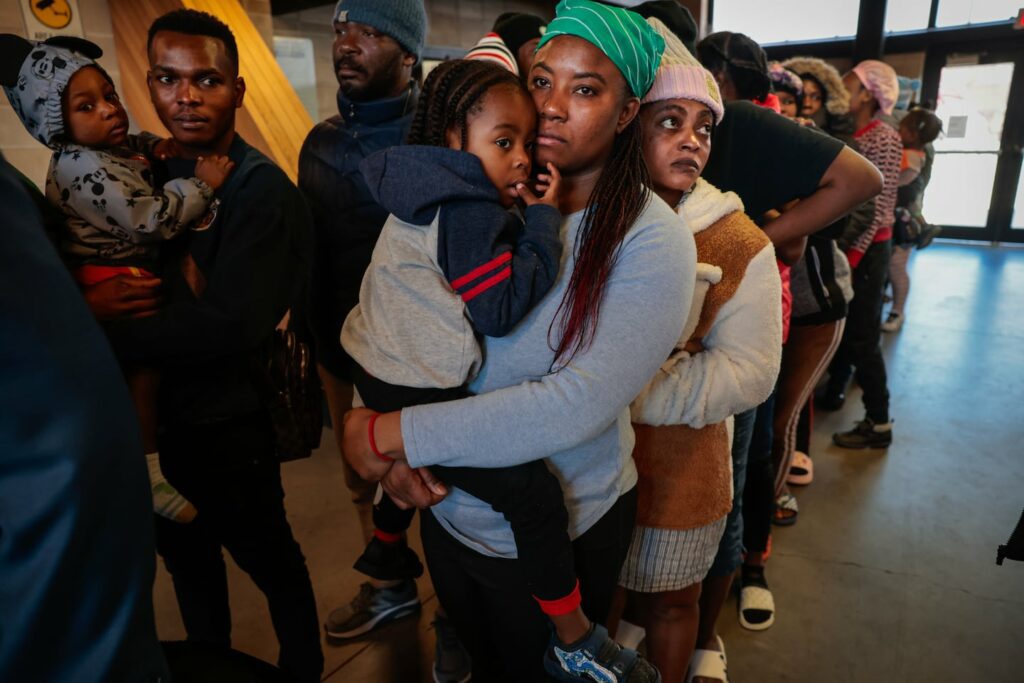The car breakdown this summer derailed his life. Arcaya could no longer drive his wife, Eduviges Cedeño, to her job at a Venezuelan restaurant. And he lost his only source of income, driving for UberEats.
It was a harsh reminder: The life he had managed to assemble here was still so fragile.
It had taken the family nearly two years to settle into this taxing yet remarkably ordinary existence — especially considering the strangeness of Arcaya’s arrival in Massachusetts.
He was one of the 49 migrants flown from Texas to Martha’s Vineyard by Florida Governor Ron DeSantis in September 2022. That surprise airlift was designed to make northern states feel the sting ofsurging immigration at the southern border. DeSantis operatives had promised Arcaya and his fellow travelers, mostly Venezuelan nationals who had crossed the border without authorization, that they would find free housing, jobs, and legal aid at the other end of the flight.
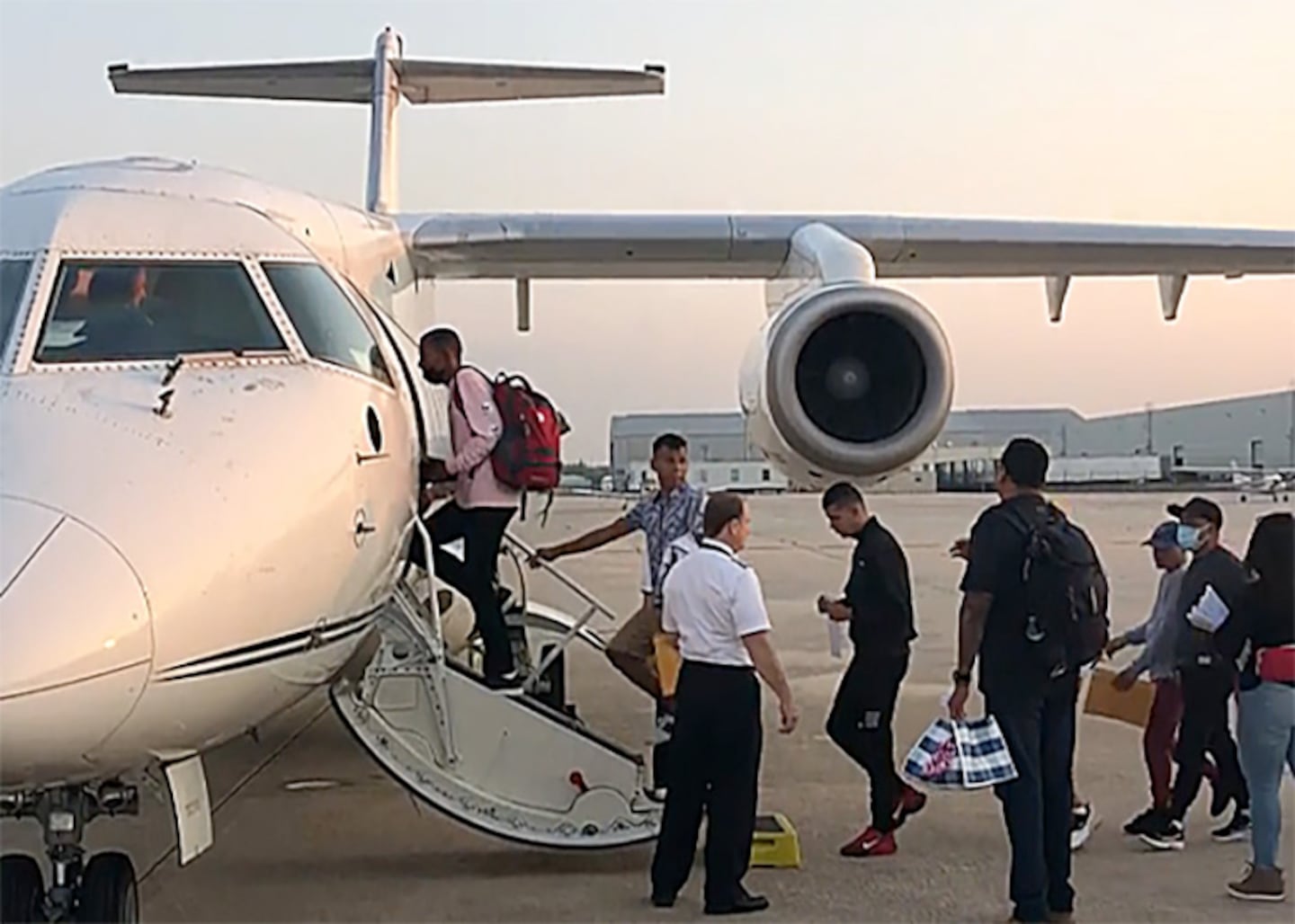 Migrants boarded a jet bound for Martha’s Vineyard in San Antonio, Texas. Florida Department of Transportation via Boston Globe public records request
Migrants boarded a jet bound for Martha’s Vineyard in San Antonio, Texas. Florida Department of Transportation via Boston Globe public records request
It was a deliberate deception, but there was also something to it.At the time, Massachusetts billed itself as a safe haven for undocumented migrants. It was the only state in the nation with a right-to-shelter law that guaranteed housing, immediately, to any family that needed it.
When the Martha’s Vineyard migrants arrived here, they benefited from an extraordinary outpouring of attention and support. State officials and Good Samaritans rushed to donate food and clothing, and helped them find places to stay. They wanted to prove DeSantis wrong: Northern liberals would not turn their backs on migrants showing up unexpectedly in their own backyard.
Two years later, at least 20,000 more migrants have arrived, and the landscape has shifted dramatically. The shelter system’s budget has ballooned to $1 billion a year. Governor Maura Healey has capped its capacity. State officials are telling migrants to stay away and instructing families to leave state shelters. Children are sleeping on the street.
The Martha’s Vineyard migrants are living with the consequences of this new reality.
A Globe review, which included locating more than half of the members of the original Martha’s Vineyard group, found that the special status they enjoyed in their first weeks here has largely faded away. They have become part of this much larger group of newcomers, navigating the same overburdened state and federal programs meant to help resettle them.
Donations were distributed to migrants at the state’s new emergency overflow shelter at the Melnea A. Cass Recreational Complex in February 2024.Craig F. Walker/Globe Staff
There are success stories. Four have settled on the Vineyard and become part of the island community that first welcomed them. Two men who initially stayed with host families have managed to bring their wives and children to Massachusetts and now have steady work and apartments.
Most have not been so lucky. Some have struggled to secure work permits. Others have languished in state shelters. Many are still scraping by with the wages from odd jobs, as delivery drivers, construction workers, or landscapers. Few, if any, have had the time or resources to become fluent in English.
At least 13 have left the state altogether, after finding it bereft of affordable housing and accessible jobs. They scattered to New Hampshire, Rhode Island, North and South Carolina, New York, Chicago, Detroit, and Atlanta. One manreturned to his hometown of Caracas.
Most of the Martha’s Vineyard 49 feel stuck in a kind of limbo, unsure how to advance their lives in the United States and unwilling to return to the political strife and economic collapse they fled in their home country.
Despite his struggles here, Arcaya, like many members of the group, said he does not regret coming to the US — and leaving Venezuela’s turmoil behind. “I won’t go back,” he said.
Estrella and her daughter gathered at the Vineyard Haven ferry terminal in Martha’s Vineyard on Sept. 16, 2022. The group was transported to Joint Base Cape Cod in Buzzards Bay.Carlin Stiehl for The Boston Globe
The two private jets chartered by the DeSantis administration took off from a San Antonio airstripon Sept. 14, 2022.
Estrella, a Peruvian woman traveling with her 7-year-old daughter, Gabriela, and her boyfriend, Eduardo, thought she was headed to New York City. For the first time in months, she felt hopeful, buoyant even. She imagined that Gabriela would have opportunities in the United States that would never have been available at home.
Estrella had left her hometown, Piura, a city of half a million in northern Peru, in the summer of 2022. She boarded a bus with Gabriela and Eduardo, leaving behind a modest but comfortable life. She owned a home and had a restaurant job shucking shellfish. But Eduardo was determined to come to the US, and Estrella didn’t want to lose him. (Estrella asked that the Globe identify her, her daughter, and her boyfriend by their middle names due to their unauthorized immigration status.)
The journey north was hellish. In Mexico, Estrella said, she, Gabriela, and Eduardo were kidnapped. While they were captive, she said, she heard what sounded like beatings in nearby rooms. They were released when the kidnappers realized they couldn’t pay a ransom.
After they reached Texas, a woman they didn’t know approached them at a McDonald’s and offered them a gift card. Then she asked if they would like to fly north.
After several hours in flight, she looked out the plane’s window and saw nothing but water to the horizon. She was alarmed, as were other passengers who started wondering aloud what was happening. A monitor in the plane’s cabin showed the flight was heading east, apparently straight out to sea, Estrella recalled in interviews this summer.
Not long after, land came into view — an island. After the plane rolled to a stop on the runway of the Vineyard’s tiny airport, Estrella, Gabriela, and Eduardo descended a staircase onto the tarmac and looked around. Where were they?
During the next two days, it seemed as if the world had descended on the Martha’s Vineyard migrants.
Migrants and volunteers celebrated together outside of St. Andrew’s Parish House in Martha’s Vineyard on Sept. 16, 2022.Carlin Stiehl for The Boston Globe
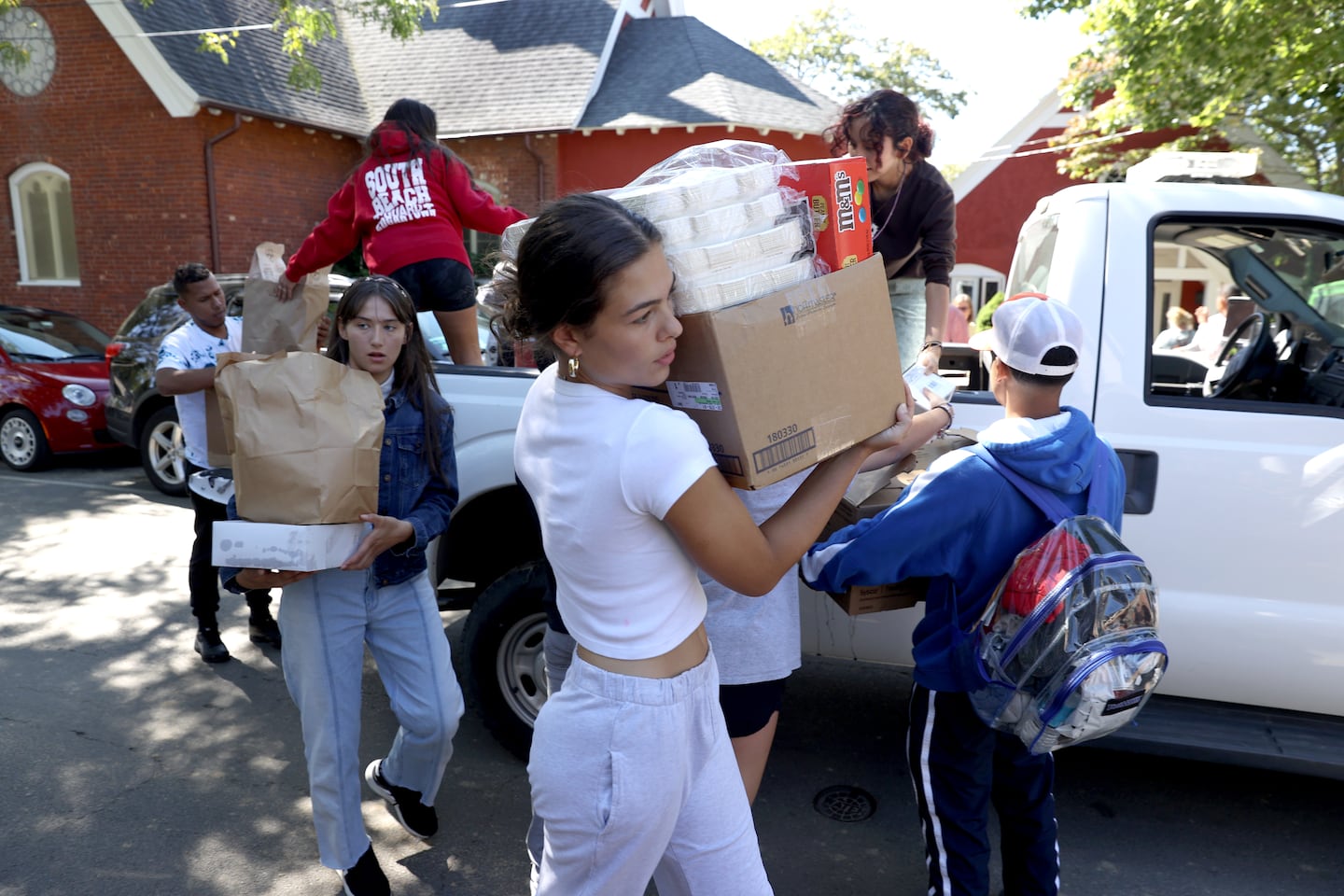 Students from Martha’s Vineyard Regional High School and migrants helped to bring donated food into St. Andrew’s Parrish House in Edgartown on Sept. 15, 2022.Jonathan Wiggs/Globe Staff
Students from Martha’s Vineyard Regional High School and migrants helped to bring donated food into St. Andrew’s Parrish House in Edgartown on Sept. 15, 2022.Jonathan Wiggs/Globe Staff
A church in Edgartown, the island’s ritziest village, opened its doors to serve as a makeshift shelter. There, volunteers from nonprofits, local families, and the island high school set up buffets of food, donated clothes, and even handed out cellphones. The press came, too, with television cameras and notepads and a thousand questions about where the migrants had come from and what they thought of DeSantis’ gambit.
Estrella and the others saw themselves on social media posts and international news broadcasts, and pieced together what had happened to them.Many felt preyed upon by DeSantis, and intensely grateful to the people of Martha’s Vineyard and Massachusetts who now seemed to be taking them in.
There was just one problem. When they asked locals if they could stay on the island, the answer was, more or less, no. There was not enough inexpensive housing nor enough jobs for migrants without work permits. It would be better if they went to the mainland.
After two days, state officials ferried Estrella and the others to a Cape Cod military base where case workers, lawyers, and local church groups helped them all find a place to stay.
That’s when the group began to disperse.
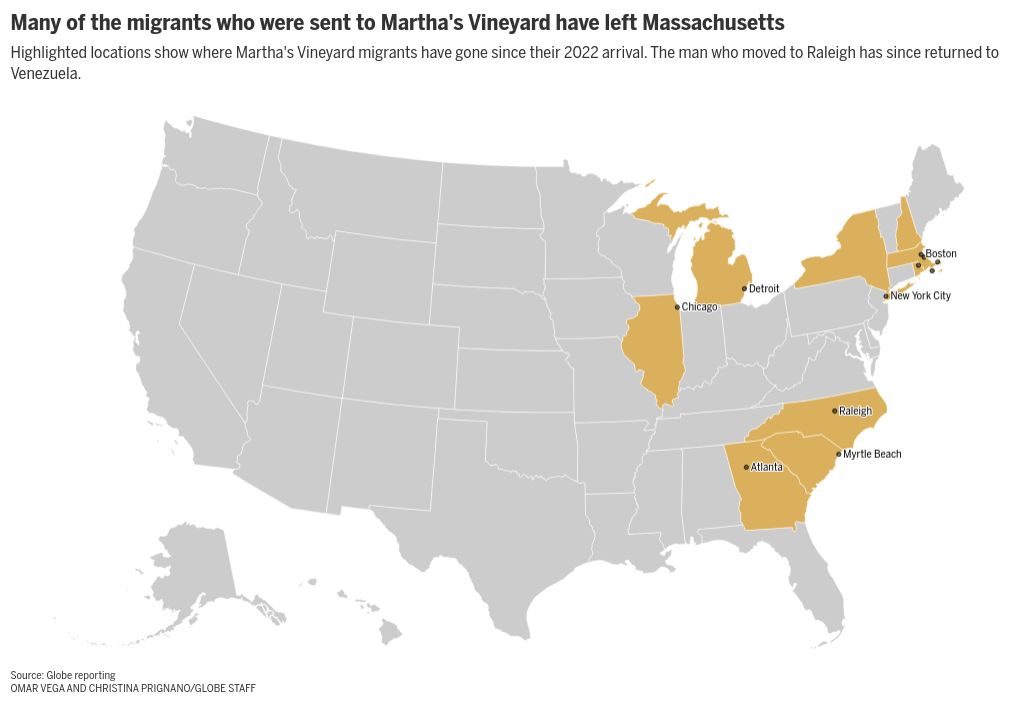
Some of the families entered the state’s emergency shelter program, which placed them in homes in Lowell or Boston. Many of the single men went to homeless shelters or a hotel. A lucky few left the base to live with host families on the Cape.
Estrella, Eduardo, and Gabriela ended up in an apartment in Newburyport. The state-funded home was a godsend, especially since, without work permits, Estrella and Eduardo couldnot find jobs. For Estrella, though,life there was also frustrating. She was used to supporting herself. Now, she was dependent on a social worker who delivered groceries every other week. She couldn’t pay back a loan she had taken from her aunt to fund her journey. When the three college-age sons she had left behind in Peru asked her to send money, she had nothing to share.
The sense of powerlessness was maddening. She had been working continuously since she was 9, aboutGabriela’s age. She had been confident she could make her own way here, just as she alwayshad.
After half a year of frustrating dependence — “I didn’t come here to have the government support me,” she said — she was antsy.
So last spring, when Eduardo told Estrella he had heard from a friend that there were jobs and cheap housing in a place called Detroit, Estrella was intrigued. Should they go?
She asked her pro-bono immigration lawyer for advice. The answer was clear. If Estrella left Massachusetts, the lawyer said, she would lose her legal representation.
But the alternative was to keep waiting. Estrella and Eduardo started topack.
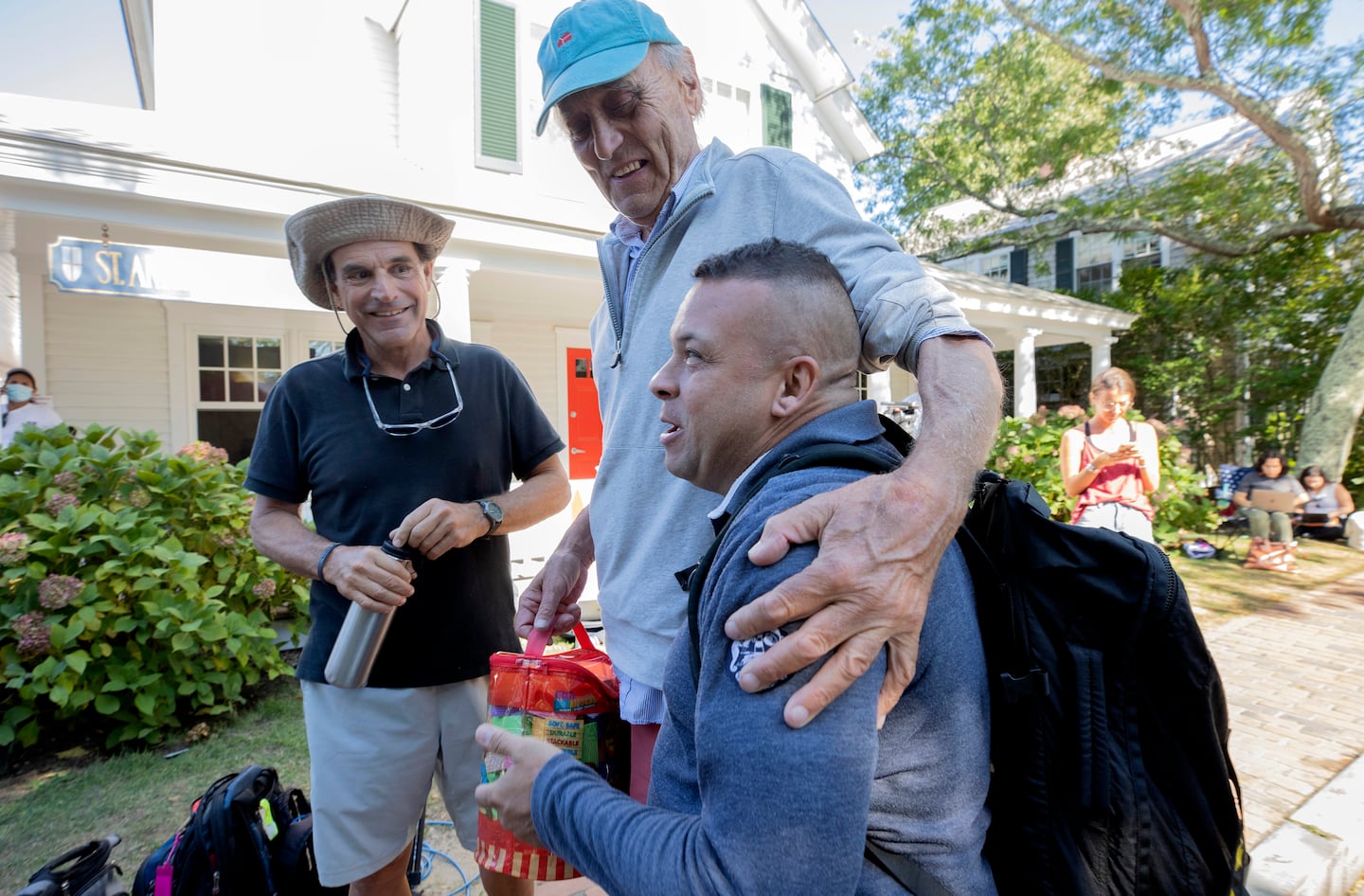 Martha’s Vineyard resident Jeff Whipple hugged Leonel, a single father from Venezuela, outside the St. Andrew’s Episcopal Church on Martha’s Vineyard on Sept. 15, 2022.Dominic Chavez for The Washington Post via Getty Images
Martha’s Vineyard resident Jeff Whipple hugged Leonel, a single father from Venezuela, outside the St. Andrew’s Episcopal Church on Martha’s Vineyard on Sept. 15, 2022.Dominic Chavez for The Washington Post via Getty Images
Other members of the Martha’s Vineyard group, confronted with the same frustrations, decided to stay put. But many of them remain, two years later, stuck on the margins of society.
Four of these men now live in a white clapboard boarding house on a busy road in downtown Stoughton. On summer days, the house — and the small, single-occupancy bedrooms inside — seem to absorb the heat radiating from the concrete surroundings. So the home’s residents gather on the house’s front deck, smoking cigarettes, hoping for a breeze.
The other residents of house, who receive government rental assistance, are mostly US citizens. They are kind to the newcomers. But they are also troubled: They have mental illnesses or addiction. At least two of them have died — one of an overdose inside the home — since the Martha’s Vineyard men moved in. Police have responded to the home multiple times per month for drug overdoses, medical emergencies, arrests, and drunkenness.
Leonel, a 47-year-old single father from Caracas, developed insomnia shortly after moving into the home. He has lived there rent-free since he and seven other men were bused from the Cape Cod military base to Stoughton. He doesn’t know who pays the bill.
Some men from the Martha’s Vineyard group moved into a boarding house in Stoughton.Jessica Rinaldi/Globe Staff
Leonel chatted with friends from the Martha’s Vineyard group outside the Stoughton boarding house on Sept. 4.Jessica Rinaldi/Globe Staff
Leonel left Venezuela “out of necessity,” he said. Under the autocratic regime of President Nicolás Maduro, the economy had collapsed and antigovernment protests — followed by brutal state crackdowns — had rocked Venezuelan cities. In the past decade, a third of the country’s citizens have left. Leonel set out alone, leaving his two teenage daughters with his parents. He was hoping, somehow, to establish himself in the US, and then send for them. (Leonel asked the Globe to identify him by only his first name because he fears being identified if he ever returns to Venezuela.)
“I want them to be here, to stay here,” he said of his daughters in an interview this summer.
But first he needs a proper home and, before that, a job.
During his first months in Stoughton, he knocked on the office doors of nearby landscaping companies and contractors. When he got lucky, it meant he’d spend a long day roofing or working in a suburban yard.
After about a year in Massachusetts, Leonel received a work permit. He believes he got it through an asylum claim he was pursuing. (Other members of the Martha’s Vineyard group received work permits this year through a special visa program available to victims of crimes after a San Antonio sheriff said said they had been subject to unlawful restraint.)
But even with the work permit in hand, he found looking for a job bewildering. “The gringo goes on the internet and, according to his skills, he applies for work,” he said. “But I don’t have a computer and I don’t know how to apply.”
In September, the home’s managers told Leonel and the other Martha’s Vineyard men that they will soon have to start paying rent. Leonel doesn’t know what he will do.
He is now working a part-time landscaping job. But it doesn’t pay enough for him to move out of the boarding house and live on his own. Better options seem out of reach to him. He was a private driver in Venezuela but here his car is too old for Uber or Lyft. He can’t decipher most job postings, and, even if he could, he worries he lacks the language skills he’d need on the job.
“You’re not a human being if you don’t speak English here,” he said.
Estrella left for work after placing a cellphone beside her sleeping daughter so that she could call if something happened while she was away in Detroit on July 26.
Jessica Rinaldi/Globe Staff
Just after 6 a.m. on a recent morning in Detroit, Estrella stood fully dressed in her basement bedroom listening for footsteps.
The room smelled earthen and just a few shafts of light came through the windows. Estrella was waiting for her housemate, Carlos, to wake up and drive her to the car factory, where they both worked. Gabriela, now 9, was splayed on a mattress fast asleep. When the floorboards creaked, Estrella put on her backpack and went upstairs. She would call Gabriela around noon to make sure she ate lunch.
The move to Detroit had not gone as planned.
When Estrella, Eduardo, and Gabriela arrived in May 2023, they found many of the same problems they thought they’d left behind in Massachusetts. The housing wasn’t as cheap and the jobs were not as plentiful as Eduardo’s friend had promised. Without work permits and with limited English, they struggled to find jobs. They were also cut off from the networks of friends and supporters they had begun to build in Massachusetts.
And Eduardo? He was gone now. He’d left Estrella for another woman.
Alone with her daughter in a new city, she found herself living an increasingly cloistered life. After losing her lawyer, she still had no legal immigration status, and she didn’t know how to keep track of her case.
Estrella and her 9-year-old daughter ate lunch in the kitchen of their shared house in Detroit on July 27. They still do not have legal immigration status and are figuring out how to make a new life in the US. Jessica Rinaldi/Globe Staff
“My fear is I go out and Immigration spots me,” she said. “Then, my daughter, where does she end up?”
She felt like her immigration case was haunting her life, omnipresent but out of sight. She did not know, until a Globe reporter informed her in September, that a judge in Bostonhad closed her case after she failed to show up for a hearing in Boston. The case could be reopened at any time.
So she stayed inside as much as she could.
Estrella plans to teach Gabriela how to call a pastor they met back in Massachusetts. She wants her to be able to get help in case the day comes when Estrella doesn’t make it home. But she hasn’t been able to bring herself to do it yet.
Returning to her life in Peru is technically an option, but Estrella won’t consider it. If she went home — if she gave up, that is— then everything she and Gabriela have been through would be for nothing.
“So many ugly things happened,” she said.
Estrella’s closest companion these days is Carlos, her housemate upstairs. She calls him Viejo — Old Man — and they bicker like siblings. Estrella cooks with him and he, in turn, drives her to work and the grocery store.
Estrella looked at the cashier as he asked her what kind of produce was in a bag. But she couldn’t understand the question because it was in English.Jessica Rinaldi/Globe Staff
Estrella and her 9-year-old daughter held hands as they walked from the park back to their apartment in Detriot.Jessica Rinaldi/Globe Staff
On a Saturday afternoon this summer, Estrella and Gabriela climbed into his car. He drove them to a Meijer supermarket on the outskirts of Detroit that looked like it was the size of a baseball stadium. As they walked the aisles together, Gabriela ran up to Estrella holding a box of ice cream cones, and smiled.
Estrella looked at the price and paused.
Rent was comingdue. School would start soon and Gabriela would need clothes and new supplies. There was a consultation with an immigration lawyer — if she could finally swing it — and she was saving to buy a car. She put the box in her cart anyway.
It was summer and they were overdue for something sweet.
Ubaldo Arcaya glanced at the UberEats app to see what jobs might be available as he and his wife, Eduviges Cedeño, and their daughter heated up dinner in the kitchen of their Dorchester apartment on Sept. 5. Jessica Rinaldi/Globe Staff
It was almost time for Arcaya to begin his nighttime delivery shift.
Standing in the living room of his Dorchester apartment, he opened his UberEats app, looking for work, while he finished eating a leftover empanada. The walls were bare. A single rose, a gift for his wife, Cedeño, from one of their teenage daughters, stood in a plastic water bottle on the kitchen pass-through. The family had moved into the state-subsidized apartment just two months earlier and had had little time — or money — to decorate.
A few minutes later, his phone emitted a familiar ding. An order was ready for pickup. He said goodbye to Cedeño and the girls, and walked into the night.
Like so many of the men on the Martha’s Vineyard flights, Arcaya had come to the US with the hope of someday bringing his family here. He was one of the few who had managed to do it. Last spring, Cedeño and their two teenage daughters flew to Boston and entered the country legally under a humanitarian program created by the Biden administration.
At the time, hewas living in the Stoughton house, alongside Leonel, the single father from Venezuela. His family’s arrival was his ticket out. It made him eligible for the state’s emergency shelter system and soon he, Cedeño, and the girls moved into a Holiday Inn in Marlborough. They stayed there for a year, waiting for work papers and a more permanent place to live, while their daughters attended Marlborough Public Schools.
Then, early this summer, a case worker told them they could soon move into a state-subsidized apartment in a multifamily home in Dorchester. The house was green, a little crooked, and full of life. A couple of other families lived there, also migrants with children of their own.
Cedeño received a work permit and soon landed her restaurant job. Although Arcaya’s work permit still hadn’t arrived, he was able to supplement the family’s income by driving for UberEats on a friend’s account.
Arcaya picked up a pizza order in Dorchester to deliver for UberEats.Jessica Rinaldi/Globe Staff
There were moments when he felt like he had finally arrived, that his family was settled. One morning, this summer he took his daughters to a school building in Roxbury to enroll them in Boston Public Schools for the upcoming year. When he got home, he waved at some of his neighbors who had gathered on their front deck. Then he hosed down his car in the driveway. It was a simple life, exactly what he had hoped for when he fled from Venezuela’s strife.
Until the car broke down. Hisdemeanor, even his appearance changed during the weeks he was struggling with the car, tension visible in his shoulders and his face. The costs mounted. A $400 labor charge one day, an expensive trip to AutoZone the next.
After a month, finally, it was fixed. But the ordeal left a hole in the family’s finances that he is still working long hours to repair. The state subsidy that allows them to live in the Dorchester apartment is limited. The less they contribute to rent every month, the sooner the money will run out. Then what?
Arcayakeeps driving. The other night, he picked up an order at a Jamaican restaurant near his house and wended his way through the evening traffic, looking for the right address. His phone dinged again with an order for pizza. He would go as long as he could, usually well past midnight.
And then he’d wake up and do it all over again.
Arcaya delivered a food order in Dorchester.Jessica Rinaldi/Globe Staff
Mike Damiano can be reached at mike.damiano@globe.com. Esmy Jimenez can be reached at esmy.jimenez@globe.com. Follow her @esmyjimenez.
Source link : http://www.bing.com/news/apiclick.aspx?ref=FexRss&aid=&tid=66ed9641852145d3a57af9a2d473bd6b&url=https%3A%2F%2Fwww.bostonglobe.com%2F2024%2F09%2F20%2Fmetro%2Fron-desantis-massachusetts-marthas-vineyard-migrants%2F&c=3244140542630457789&mkt=en-us
Author :
Publish date : 2024-09-19 23:00:00
Copyright for syndicated content belongs to the linked Source.
